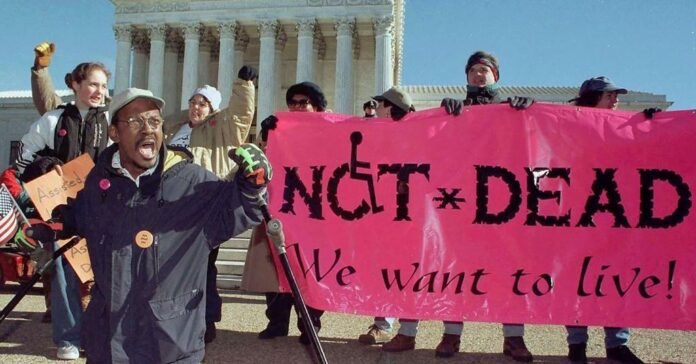Dir: Reid Davenport. US. 2025. 99mins
Revisiting a landmark right-to-die court docket case from the Eighties permits filmmaker Reid Davenport to take the lengthy view of attitudes to incapacity and loss of life. His fascinating documentary Life After makes use of a lot of compelling particular person tales to light up larger questions round what has modified and what stays the identical. His contemporary perspective on good intentions, silenced voices and moral dilemmas makes a useful contribution to debates round legalising assisted dying, and will readily safe future publicity on documentary channels and streamers.
The attraction of the movie is the way in which it views issues from a distinct angle
Disabled filmmaker Davenport received a US Documentary directing award at Sundance for his earlier characteristic I Didn’t See You There (2022), and Life After continues his problem to entrenched attitudes and lazy assumptions. He begins with archive footage from 1983, when US citizen Elizabeth Bouvia sought authorized permission to finish her life. Paralysed by cerebral palsy and in ache from extreme degenerative arthritis, Bouvia didn’t wish to spend her days in a facility and argued that “the standard of my life is over”. The court docket didn’t resolve in her favour.
Davenport is intrigued by her case and much more so when he reads a Wikipedia entry that suggesting she should still be alive some 40 years later. Discovering what occurred to Bouvia is the spine of a wide-ranging movie that presents persuasive proof on behalf of these with main issues about increasing assisted dying rights to the disabled group.
Davenport is an interesting determine as he performs detective to trace down Bouvia and meets others who’ve cautionary tales to inform of being disabled and equally involved in regards to the high quality of their lives. He meets Michal, whose mom was his main carer till her loss of life left him unable to take care of an unbiased life-style. Healthcare is not going to present the sources for his wants, leaving him to face a future in a care facility that may really feel like “incarceration”. Melissa Hickson talks of her husband Michael who was left with a number of well being challenges after a cardiac arrest in 2017; the strain from the medical authorities was at all times to “let him go”. Jerika Bolen had spinal muscular atrophy when she selected to die in 2016 on the age of simply 14. Davenport questions whether or not the group that rallied round her resolution could have additionally been accountable for it. Was she surrounded by folks “who thought she’d be higher off lifeless”?
The tales in Life After communicate of the pressures to finish life, the exorbitant prices of healthcare, medical doctors who really feel they know greatest and politicians satisfied that they’re doing the appropriate factor. The attraction of the movie is the way in which it views issues from a distinct angle. Are these searching for to supply an possibility to finish the struggling and ache of the disabled additionally wanting their removing from society? Is the quality-of-life argument simply one other means of convincing disabled those that their lives are with out price? Ableist attitudes are onerous to counter and unbiased company a wrestle to realize.
Elegantly edited by Don Bernier, Life After travels throughout America and Canada, introducing every new location with lyrical photos and a mild soundtrack from Robert Aiki Aubrey Lowe that makes use of an array of synths, choral music and voices. Davenport does in the end uncover Bouvia’s life story by interviews together with her sisters Rebecca and Teresa. It’s extra complicated than he may have imagined, and a lot greater than if she had been allowed to die in 1983.
Davenport makes the purpose that he’s not in opposition to the supply of assisted dying and claims his movie shouldn’t be about suicide however about folks “determined to seek out their place in a world that perpetually rejects them”. If we imagine in a proper to die, Life After asserts that we also needs to imagine in a proper to reside.
Manufacturing firm: Multitude Movies
Worldwide gross sales: Collectively Movies gross sales@togetherfilms.org
Producer: Colleen Cassingham
Cinematography: Amber Fares
Enhancing: Don Bernier
Music: Robert Aiki Aubrey Lowe
